英语语法 - 名词的分类
英语语法 名词

英语语法名词名词是指表达人、事物、地方和抽象概念的词语,它通常用来作为主语、宾语、表语或补语。
名词可以分为以下几类:1. 可数名词(Countable nouns):表示可以被数的名词,可以用来表示单数或复数形式。
例如:book(书)、dog(狗)、apple(苹果)等。
2. 不可数名词(Uncountable nouns):表示不能被数的名词,只能用单数形式。
例如:water(水)、money(钱)、information(信息)等。
3. 集合名词(Collective nouns):用来表示一组人或事物的名词。
例如:team(团队)、family(家庭)等。
4. 特殊名词(Proper nouns):用来表示特定的人、地点或事物的名词,通常以大写字母开头。
例如:John(约翰)、London(伦敦)、Coca-Cola(可口可乐)等。
5. 抽象名词(Abstract nouns):表示抽象概念、情感或状态的名词。
例如:love(爱)、happiness(幸福)、knowledge (知识)等。
6. 物质名词(Material nouns):表示物质或材料的名词。
例如:wood(木材)、iron(铁)等。
名词在句子中可以有以下几种功能:1. 主语(Subject):名词作为句子的主要动作执行者或主体的角色。
例如:Dogs are loyal.(狗很忠诚。
)2. 宾语(Object):名词作为动作的接受者或作为介词的宾语。
例如:She bought a new dress.(她买了一件新裙子。
)3. 表语(Predicate Noun):名词用来描述或补充主语的属性。
例如:He is a doctor.(他是一名医生。
)4. 定语(Attributive noun):名词作为修饰其他名词的形容词。
例如:a car accident(一场车祸)5. 补语(Complement):名词作为动词或介词后面的补充性信息。
高中英语语法名词
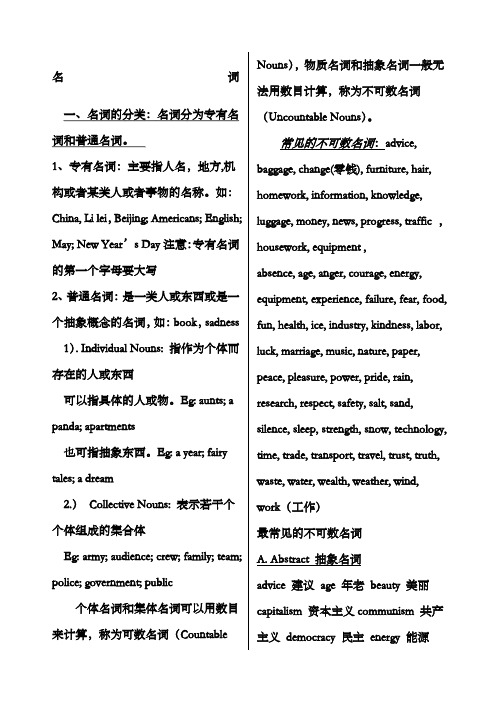
名词一、名词的分类:名词分为专有名词和普通名词。
1、专有名词:主要指人名,地方,机构或者某类人或者事物的名称。
如:China, Li lei,Beijing; Americans; English; May; New Year’s Day注意:专有名词的第一个字母要大写2、普通名词:是一类人或东西或是一个抽象概念的名词,如:book,sadness 1). Individual Nouns: 指作为个体而存在的人或东西可以指具体的人或物。
Eg: aunts; a panda; apartments也可指抽象东西。
Eg: a year; fairy tales; a dream2.)Collective Nouns: 表示若干个个体组成的集合体Eg: army; audience; crew; family; team; police; government; public个体名词和集体名词可以用数目来计算,称为可数名词(Countable Nouns),物质名词和抽象名词一般无法用数目计算,称为不可数名词(Uncountable Nouns)。
常见的不可数名词:advice, baggage, change(零钱), furniture, hair, homework, information, knowledge, luggage, money, news, progress, traffic ,housework, equipment ,absence, age, anger, courage, energy, equipment, experience, failure, fear, food, fun, health, ice, industry, kindness, labor, luck, marriage, music, nature, paper, peace, pleasure, power, pride, rain, research, respect, safety, salt, sand, silence, sleep, strength, snow, technology, time, trade, transport, travel, trust, truth, waste, water, wealth, weather, wind, work(工作)最常见的不可数名词A. Abstract 抽象名词advice 建议age 年老beauty 美丽capitalism 资本主义communism 共产主义democracy 民主energy 能源fun 乐趣happiness 幸福help 帮助honesty 诚实information 信息justice 正义kindness 善knowledge 知识laughter 笑声liberty 自由life 生命、生物、活力play 玩recreation 娱乐strength 实力trouble 麻烦truth 真理virtue 美德wisdom 智慧work 工作youth 青年B. Matter, material 物质名词air 空气beer 啤酒blood 血液bread 面包butter 黄油cake 蛋糕chalk 粉笔cheese 奶酪coal 煤coffee 咖啡electricity 电力fog 雾fish 鱼gold 黄金grass 草hair 头发ice 冰ink 油墨iron 铁juice 果汁lumber 木材meat 肉milk 牛奶oil 油oxygen 氧气paper 纸rain 雨rice 水稻smoke 烟雾snow 雪soap 肥皂soup 汤sugar 糖tea 茶water 水wine 葡萄酒wood 木C. Generic terms 属类business 商业change 零钱equipment 设备fruit 水果furniture 家具jewelry 珠宝luggage 行李machinery 机械mail 邮件money 金钱news 新闻propaganda 宣传scenery 风景slang 俚语stationery 文具traffic 交通vegetation 植被weather 天气D. Subject matter 学科architecture 建筑art 艺术chemistry 化学civics 市政学economics 经济学engineering 工程English 英语geology 地质学grammar 语法history 历史literature 文学mathematics 数学music 音乐philosophy 哲学physics 物理学science 科学technology 技术vocabulary 词汇E. Sports and recreation 运动和休闲baseball 棒球basketball 篮球bridge 桥牌camping 露营dancing 跳舞drinking 饮酒football 足球golf 高尔夫hiking 远足hockey 曲棍球homework 家庭作业hunting 狩猎opera 歌剧sailing 帆船singing歌唱softball 垒球swimming 游泳television 电视traveling 旅行volleyball 排球F. Countable and non-countable nouns 一词多意要具体对待age 年老/年龄baseball (and other balls) 棒球(运动)/(一个)棒球(和其他球)beer (and other drinks) 啤酒(物质)/(一杯)啤酒(和其他饮料)business 商业/公司change 找零/变改company 陪伴/公司dope 毒品/傻瓜glass 玻璃/玻璃杯、眼镜iron 铁/熨斗paper 纸/文件play 玩耍/戏剧room 空间/房间smoke 烟雾/香烟tape 胶带(材料)/胶带物体)tea 茶叶/下午茶work 工作/着作youth 青春/青年人3). Material Nouns: 指无法分为个体的物质。
小学英语语法详解--名词
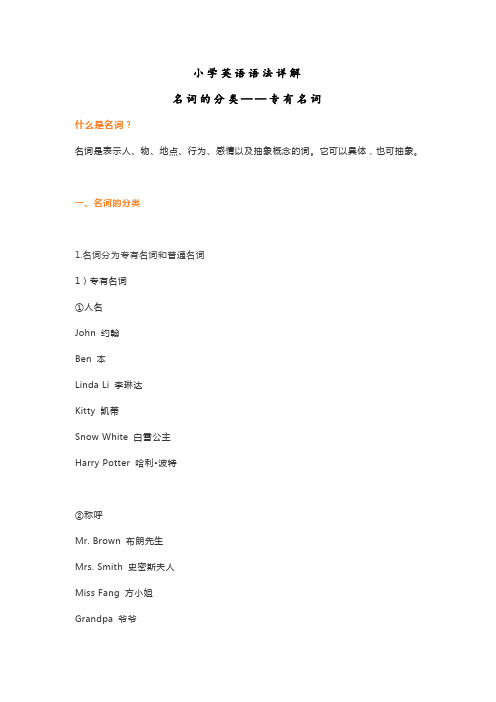
小学英语语法详解名词的分类——专有名词什么是名词?名词是表示人、物、地点、行为、感情以及抽象概念的词。
它可以具体,也可抽象。
一、名词的分类1.名词分为专有名词和普通名词1)专有名词①人名John 约翰Ben 本Linda Li 李琳达Kitty 凯蒂Snow White 白雪公主Harry Potter 哈利•波特②称呼Mr. Brown 布朗先生Mrs. Smith 史密斯夫人Miss Fang 方小姐Grandpa 爷爷③品牌Teddy Bear 泰迪熊④月份January —月February 二月March 三月⑤星期Sunday 周日Monday 周一Tuesday 周二⑥节日Christmas圣诞节Easter复活节the Children's Day 儿童节⑦建筑,公园,车站,路名the Great Wall 长城Yan'an Road 延安路the Century Park 世纪公园Zhongshan Park Station 中山公园站⑧学科,语言Maths数学Music音乐Chinese 中文⑨国家,城市China中国Nanjing 南京Australia澳大利亚Sydney悉尼学习小贴士:专有名词是表示特定的人、地方或事物的词,专有名词的第一个字母要大写!让我们一起看看下面的例子:★Mrs. White goes to the Century Park every Sunday.怀特太太每个周日都要去世纪公园。
★Kitty lives in America but she can speak Chinese.凯蒂生活在美国,但她会说中文。
从上面两句例句中,你找到多少专有名词了呢?小学英语语法详解名词的分类——普通名词什么是名词?名词是表示人、物、地点、行为、感情以及抽象概念的词。
它可以具体,也可抽象。
一、名词的分类1.名词分为专有名词和普通名词2)普通名词①个体名词:表示单个的人和事物car小轿车room房间fan电扇photo照片②集体名词:表示一群人或一些事物的名称people人们family家庭army 军队government 政府group集团③复合名词:两个或两个以上名词连在一起构成的名词。
英语语法:名词的分类、单复数和所有格

cities , babies
(2)以元音字母+y结尾的ห้องสมุดไป่ตู้词,加s
读/z/
days , boys , toys
以f或fe结尾的名词
变f或fe为v,再加es
读/vz/
knives , leaves
写出下列各词的复数形式:
tomato, city, boy, radio, leaf, fly, photo, mouse,box,wife ,Sunday, class,Chinese ,zoo ,exam ,German ,sheep, fish, beach ,wish, glass, leaf, student, deer, baby, potato
可数名词的单数变复数(规则变化)
以辅音字母+y结尾的名词,把y改为i再加es :
例:city---cities, family---families 以f或fe结尾的名词,变f或fe为v再加es
例:leaf-leaves, knife-knives, wife-wives
可数名词的单数变复数(规则变化)
写出30个可数名词,并写出其复数形式(1+1)
03
写出20个不可数名词(1+1)
02
复习并背诵名词单数变复数的规则.
01
Homework
以-s , -sh , -ch , -x结尾的名词
词尾加-es
读/iz/
buses , watches , wishes , boxes
以-o结尾的名词
词尾加-s或-es
读/z/
radios , kangaroos , heroes , potatoes
以-y结尾的名词
英语语法:名词的分类
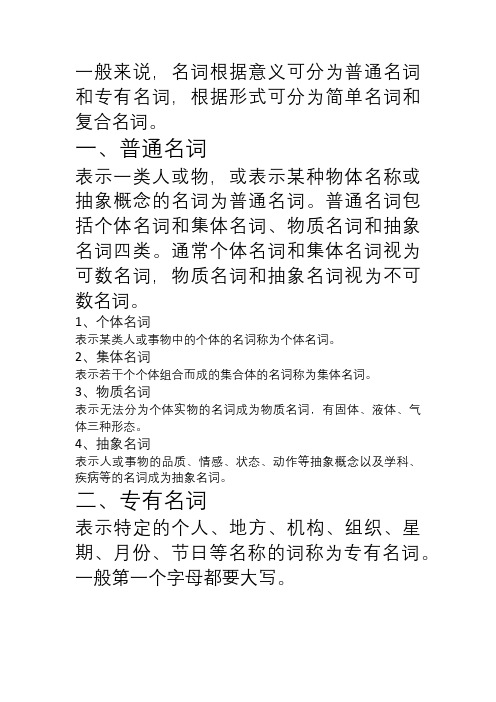
一般来说,名词根据意义可分为普通名词和专有名词,根据形式可分为简单名词和复合名词。
一、普通名词
表示一类人或物,或表示某种物体名称或抽象概念的名词为普通名词。
普通名词包括个体名词和集体名词、物质名词和抽象名词四类。
通常个体名词和集体名词视为可数名词,物质名词和抽象名词视为不可数名词。
1、个体名词
表示某类人或事物中的个体的名词称为个体名词。
2、集体名词
表示若干个个体组合而成的集合体的名词称为集体名词。
3、物质名词
表示无法分为个体实物的名词成为物质名词,有固体、液体、气
体三种形态。
4、抽象名词
表示人或事物的品质、情感、状态、动作等抽象概念以及学科、
疾病等的名词成为抽象名词。
二、专有名词
表示特定的个人、地方、机构、组织、星期、月份、节日等名称的词称为专有名词。
一般第一个字母都要大写。
专有名词中每一个单词的第一个字母一般都要大写,其中冠词和部分较短的介词可以不大写,也可以将所有的字母动要大写。
三、复合名词。
单个名词称为简单名词,而由单个名词加一个或一个以上的名词或其他词类组成的词称为复合名词。
英语语法大全之——名词
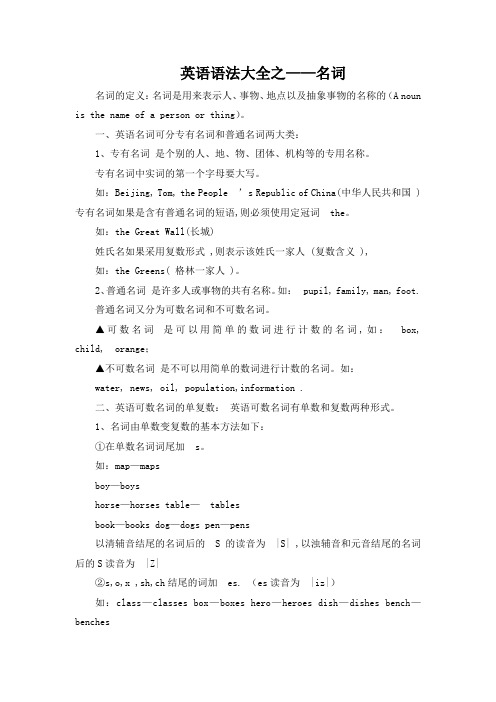
英语语法大全之——名词名词的定义:名词是用来表示人、事物、地点以及抽象事物的名称的(A noun is the name of a person or thing)。
一、英语名词可分专有名词和普通名词两大类:1、专有名词是个别的人、地、物、团体、机构等的专用名称。
专有名词中实词的第一个字母要大写。
如:Beijing, Tom, the People ’s Republic of China(中华人民共和国 )专有名词如果是含有普通名词的短语,则必须使用定冠词the。
如:the Great Wall(长城)姓氏名如果采用复数形式 ,则表示该姓氏一家人 (复数含义 ),如:the Greens( 格林一家人 )。
2、普通名词是许多人或事物的共有名称。
如:pupil, family, man, foot.普通名词又分为可数名词和不可数名词。
▲可数名词是可以用简单的数词进行计数的名词,如:box, child, orange;▲不可数名词是不可以用简单的数词进行计数的名词。
如:water, news, oil, population,information .二、英语可数名词的单复数:英语可数名词有单数和复数两种形式。
1、名词由单数变复数的基本方法如下:①在单数名词词尾加s。
如:map—mapsboy—boyshorse—horses table—tablesbook—books dog—dogs pen—pens以清辅音结尾的名词后的S的读音为|S| ,以浊辅音和元音结尾的名词后的S读音为|Z|②s,o,x ,sh,ch结尾的词加es. (es读音为|iz|)如:class—classes box—boxes hero—heroes dish—dishes bench—benchesbus—buses brush—brushes[注]:少数以元音字母o 结尾的名词 ,变复数时直接在词尾 +s。
如:photo—photos piano—pianos radio—radios(但Negro、hero、potato、tomato、mango、mosquito均+es,其他+s) 黑人、英雄、土豆、西红柿、芒果、蚊子③以辅音字母 +y 结尾的名词 ,变y 为i,再加 es。
英语名词的分类与用法

英语名词的分类与用法名词是英语语法中的一大类词汇,用来表示人、事、物、地点等。
在英语中,名词可以根据其性质和用途进行分类。
本文将介绍英语名词的分类以及它们的常见用法。
一、可数名词和不可数名词可数名词(countable nouns)是可以单独使用并且可以数的名词,可以用来表示单数和复数。
比如:"book"(书)是一个可数名词,我们可以说 "one book"(一本书)或 "three books"(三本书)。
不可数名词(uncountable nouns)则是无法用数字来计数的名词,它们通常表示抽象概念、物质或集合。
比如:"water"(水)是一个不可数名词,我们只能说 "some water"(一些水)或 "a glass of water"(一杯水)。
二、单数名词和复数名词单数名词(singular nouns)表示一个人、物或概念。
例如:"cat"(猫)、"table"(桌子)。
复数名词(plural nouns)表示多个人、物或概念。
例如:"cats"(猫们)、"tables"(桌子们)。
一般情况下,为了将可数名词变成复数形式,我们在名词末尾加上"s"。
但也有一些不规则名词,它们在复数形式上有不同的变化规则。
比如:"child"(孩子)的复数形式是 "children"(孩子们),"man"(男人)的复数形式是 "men"(男人们)。
三、名词的用法名词在句子中可以担当主语、宾语、定语或补语的角色。
接下来将详细介绍名词在不同语法位置上的使用。
1. 名词作主语名词可以作为主语开头使用,来指代句子的主要内容。
英语名词的分类与用法
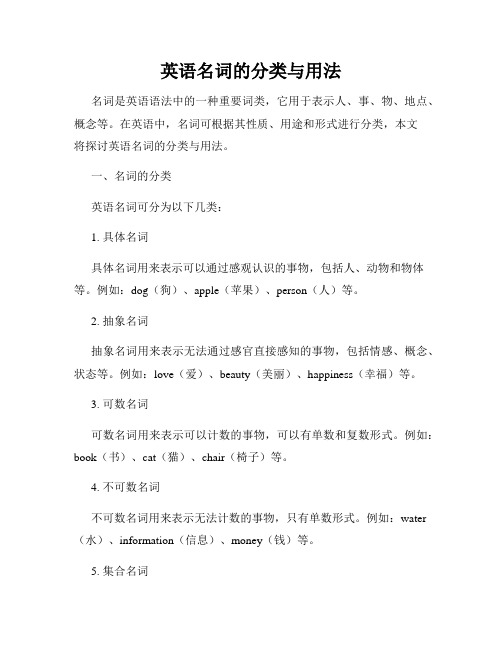
英语名词的分类与用法名词是英语语法中的一种重要词类,它用于表示人、事、物、地点、概念等。
在英语中,名词可根据其性质、用途和形式进行分类,本文将探讨英语名词的分类与用法。
一、名词的分类英语名词可分为以下几类:1. 具体名词具体名词用来表示可以通过感观认识的事物,包括人、动物和物体等。
例如:dog(狗)、apple(苹果)、person(人)等。
2. 抽象名词抽象名词用来表示无法通过感官直接感知的事物,包括情感、概念、状态等。
例如:love(爱)、beauty(美丽)、happiness(幸福)等。
3. 可数名词可数名词用来表示可以计数的事物,可以有单数和复数形式。
例如:book(书)、cat(猫)、chair(椅子)等。
4. 不可数名词不可数名词用来表示无法计数的事物,只有单数形式。
例如:water (水)、information(信息)、money(钱)等。
5. 集合名词集合名词用来表示由多个部分组成的整体,例如:family(家庭)、team(团队)、group(小组)等。
6. 特指名词特指名词用来表示特定的人或事物。
例如:the Sun(太阳)、the White House(白宫)等。
二、名词的用法除了根据分类,名词还可以根据其在句子中的作用来使用。
1. 主语名词可以作为句子的主语,用来说明动作的执行者或句子的主要内容。
例如:Jane is a teacher.(简是一名教师。
)2. 宾语名词可以作为句子的宾语,说明接受动作的对象。
例如:He loves music.(他喜爱音乐。
)3. 表语名词可以作为句子的表语,用来说明主语的身份、特征或状态。
例如:She is a doctor.(她是一名医生。
)4. 定语名词可以作为句子的定语,修饰其他名词或代词。
例如:a blue car (一辆蓝色的车)。
5. 同位语名词可以作为句子的同位语,与另一个名词并列,起到进一步解释、补充说明的作用。
例如:My teacher, Mr. Smith, is very kind.(我的老师,史密斯先生,非常友好。
- 1、下载文档前请自行甄别文档内容的完整性,平台不提供额外的编辑、内容补充、找答案等附加服务。
- 2、"仅部分预览"的文档,不可在线预览部分如存在完整性等问题,可反馈申请退款(可完整预览的文档不适用该条件!)。
- 3、如文档侵犯您的权益,请联系客服反馈,我们会尽快为您处理(人工客服工作时间:9:00-18:30)。
A bar of chocolate. A bottle of milk. A pound of sugar. Half a pound of coffee. A quarter of a pound of tea. And a tin of tobacco. Is that tin of tobacco for me? Well, it’s certainly not for me!
Lesson 41 Penny’s bag
Is that bag heavy, Penny? Not very. Here! Put it on this chair. What’s in it? A piece of cheese. A loaf of bread. A bar of soap.
Can you tell me 10 nouns
Lesson 41 Penny’s bag
Is that bag heavy, Penny? Not very. Here! Put it on this chair. What’s in it? A piece of cheese. A loaf of bread. A bar of soap.
1.为了更加健康,我已改变了饮食。 2.以前,我很少吃水果、蔬菜,喜欢糕点、糖果和可乐。 3.现在,早餐时总吃一根香蕉,一些面包,喝一杯牛奶。午餐时,通 常吃鱼和蔬菜。 4.我现在正变得越来越健康,学习情况也因此而大大改善了。
Homework
Lesson 1 A private conversation 私人谈话
Last week I went to the theatre. I had a very good seat. The play was very interesting. I did not enjoy it. A young man and a young woman were sitting behind me. They were talking loudly. I got very angry. I could not hear the actors. I turned round. I looked at the man and the woman angrily. They did not pay any attention. In the end, I could not bear it. I turned round again. 'I can't hear a word!' I said angrily. ' It's none of your business,' the young man said rudely. 'This is a private conversation!'.
Read aloud
1. I've got a steak, some red chilli peppers, some potatoes…
2. OK, well, I've got a lemon, an apple … and some chicken breasts.
3. I'd like a blue pen, please.
可数名词 & 不可数名词 many & much
a / an/s bag
Is that bag heavy, Penny? Not very. Here! Put it on this chair. What’s in it? A piece of cheese. A loaf of bread. A bar of soap.
量词
你知道中国哪些量词? eg. 一只 一个 你知道英文哪些量词?
Lesson 41 Penny’s bag
Is that bag heavy, Penny? Not very. Here! Put it on this chair. What’s in it? A piece of cheese. A loaf of bread. A bar of soap.
量词
A piece of cheese. A loaf of bread. A bar of soap. A bar of chocolate. A bottle of milk. A pound of sugar/coffee. A pound of tea. A tin of tobacco.
A bar of chocolate. A bottle of milk. A pound of sugar. Half a pound of coffee. A quarter of a pound of tea. And a tin of tobacco. Is that tin of tobacco for me? Well, it’s certainly not for me!
A bar of chocolate. A bottle of milk. A pound of sugar. Half a pound of coffee. A quarter of a pound of tea. And a tin of tobacco. Is that tin of tobacco for me? Well, it’s certainly not for me!
Lesson 41 Penny’s bag
Is that bag heavy, Penny? Not very. Here! Put it on this chair. What’s in it? A piece of cheese. A loaf of bread. A bar of soap.
A bar of chocolate. A bottle of milk. A pound of sugar. Half a pound of coffee. A quarter of a pound of tea. And a tin of tobacco. Is that tin of tobacco for me? Well, it’s certainly not for me!
1.为了更加健康,我已改变了饮食。 2.以前,我很少吃水果、蔬菜,喜欢糕点、糖果和可乐。 3.现在,早餐时总吃一根香蕉,一些面包,喝一杯牛奶。午餐时,通 常吃鱼和蔬菜。 4.我现在正变得越来越健康,学习情况也因此而大大改善了。
饮食 Diet
I have changed my diet because I want to be healthier. Before, I seldom ate fruits and vegetables. I liked cakes, sweets and cola. Now , I always have a banana, some bread and a glass of milk for breakfast. I usually eat fish and vegetables for lunch. I’m now becoming healthier and healthier. Because of this, my studies have greatly improved.
Oral English
饮食 Diet
I have changed my diet because I want to be healthier. Before, I seldom ate fruit and vegetables. I liked cakes, sweets and cola. Now , I always have a banana, some bread and a glass of milk for breakfast. I usually eat fish and vegetables for lunch. I’m now becoming healthier and healthier. Because of this, my studies have greatly improved.
A bar of chocolate. A bottle of milk. A pound of sugar. Half a pound of coffee. A quarter of a pound of tea. And a tin of tobacco. Is that tin of tobacco for me? Well, it’s certainly not for me!
Lesson 1 A private conversation 私人谈话
Last week I went to the theatre. I had a very good seat. The play was very interesting. I did not enjoy it. A young man and a young woman were sitting behind me. They were talking loudly. I got very angry. I could not hear the actors. I turned round. I looked at the man and the woman angrily. They did not pay any attention. In the end, I could not bear it. I turned round again. 'I can't hear a word!' I said angrily. ' It's none of your business,' the young man said rudely. 'This is a private conversation!'.
